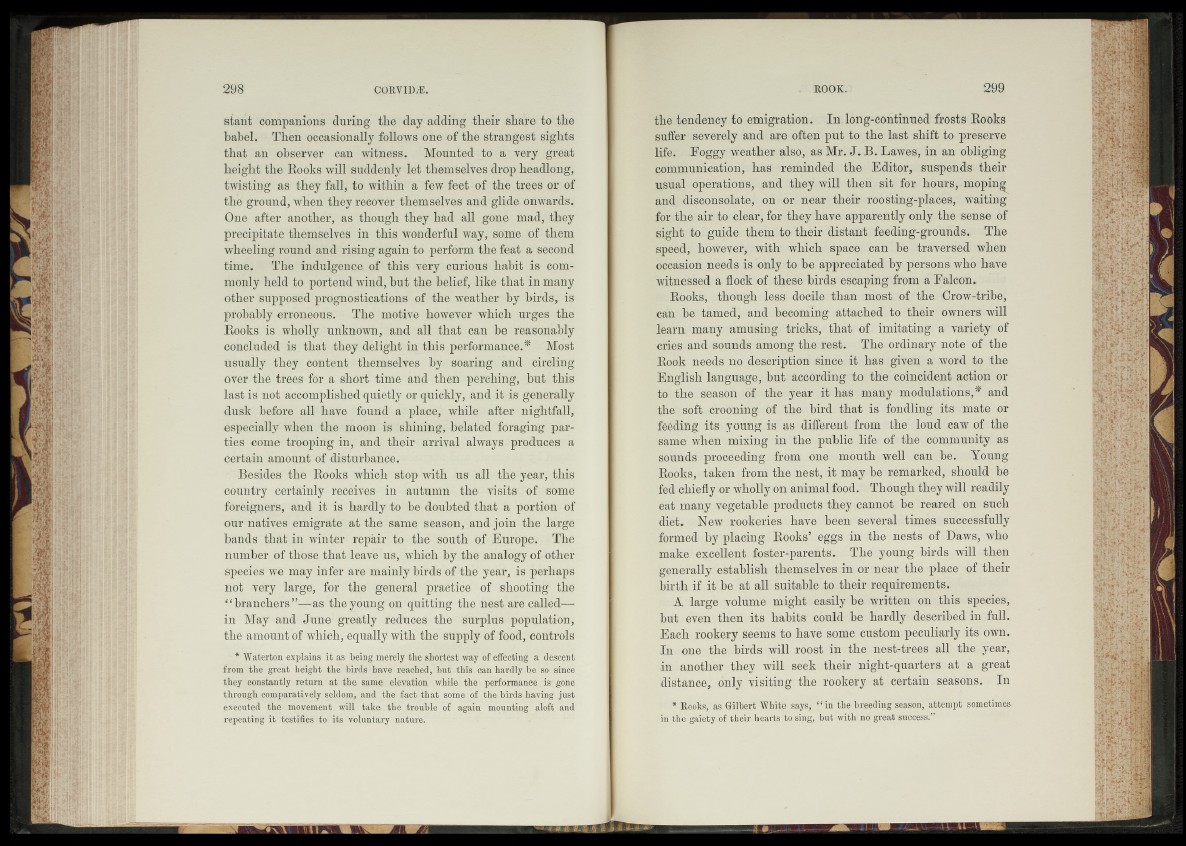
stant companions during the day adding their share to the
babel. Then occasionally follows one of the strangest sights
that an observer can witness. Mounted to a very great
height the Rooks will suddenly let themselves drop headlong,
twisting as they fall, to within a few feet of the trees or of
the ground, when they recover themselves and glide onwards.
One after another, as though they had all gone mad, they
precipitate themselves in this wonderful way, some of them
wheeling round and rising again to perform the feat a second
time. The indulgence of this very curious habit is commonly
held to portend wind, but the belief, like that in many
other supposed prognostications of the weather by birds, is
probably erroneous. The motive however which urges the
Rooks is wholly unknown, and all that can be reasonably
concluded is that they delight in this performance.* Most
usually they content themselves by soaring and circling
over the trees for a short time and then perching, hut this
last is not accomplished quietly or quickly, and it is generally
dusk before all have found a place, while after nightfall,
especially when the moon is shining, belated foraging parties
come trooping in, and their arrival always produces a
certain amount of disturbance.
Besides the Rooks which stop with us all the year, this
country certainly receives in autumn the visits of some
foreigners, and it is hardly to be doubted that a portion of
our natives emigrate at the same season, and join the large
hands that in winter repair to the south of Europe. The
number of those that leave us, which by the analogy of other
species we may infer are mainly birds of the year, is perhaps
not very large, for the general practice of shooting the
“ branchers”—as the young on quitting the nest are called—
in May and June greatly reduces the surplus population,
the amount of which, equally with the supply of food, controls
* Waterton explains it as being merely the shortest way of effecting a descent
from the great height the birds have reached, but this can hardly be so since
they constantly return at the same elevation while the performance is gone
through comparatively seldom, and the fact that some of the birds having just
executed the movement will take the trouble of again mounting aloft and
repeating it testifies to its voluntary nature.
the tendency to emigration. In long-continued frosts Rooks
suffer severely and are often put to the last shift to preserve
life. Eoggy weather also, as Mr. J. B. Lawes, in an obliging
communication, has reminded the Editor, suspends their
usual operations, and they will then sit for hours, moping
and disconsolate, on or near their roosting-places, waiting
for the air to clear, for they have apparently only the sense of
sight to guide them to their distant feeding-grounds. The
speed, however, with which space can be traversed when
occasion needs is only to be appreciated by persons who have
witnessed a flock of these birds escaping from a Falcon.
Rooks, though less docile than most of the Crow-tribe,
can be tamed, and becoming attached to their owners will
learn many amusing tricks, that of imitating a variety of
cries and sounds among the rest. The ordinary note of the
Rook needs no description since it has given a word to the
English language, but according to the coincident action or
to the season of the year it has many modulations,* and
the soft crooning of the bird that is fondling its mate or
feeding its young is as different from the loud caw of the
same when mixing in the public life of the community as
sounds proceeding from one mouth well can be. Young
Rooks, taken from the nest, it may be remarked, should be
fed chiefly or wholly on animal food. Though they will readily
eat many vegetable products they cannot be reared on such
diet. New rookeries have been several times successfully
formed by placing Rooks’ eggs in the nests of Daws, who
make excellent foster-parents. The young birds will then
generally establish themselves in or near the place of their
birth if it be at all suitable to their requirements.
A large volume might easily be written on this species,
but even then its habits could be hardly described in full.
Each rookery seems to have some custom peculiarly its own.
In one the birds will roost in the nest-trees all the year,
in another they will seek their night-quarters at a great
distance, only visiting the rookery at certain seasons. In
* Rooks, as Gilbert White says, “ in the breeding season, attempt sometimes
in the gaiety of their hearts to sing, but with no great success.”